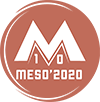Deathways in the Mesolithic are varied and present significant variation across time and space. Recent discoveries, but also new approaches to older finds and archives, reveal an ever more complex and varied archaeological record of the treatment of the dead in Mesolithic Europe. This session seeks to problematize central aspects of human engagement with death in the Mesolithic, exploring dimensions such as cognition and symbolic thought, emotion and experience, the body, ritual and social relations - through the lens of human attitudes towards death in the archaeological record. We invite papers that combine empiric evidence with a strong interpretative framework, and push the theoretical and methodological boundaries toward a more nuanced and better insight into the diverse treatment of the dead during the Mesolithic, capturing the state of the field in all its current diversity.
|
|
|
Death and the dead: new approaches to Mesolithic mortuary practices
1 : Linnaeus University
2 : Human Evolution, Department of Organismal Biology, Uppsala University, Sweden
3 : UNIARQ – Centro de Arqueologia da Universidade de Lisboa
4 : University of Tartu
* : Corresponding author
Institute of History and Archaeology -
Estonie

 PDF version
PDF version
